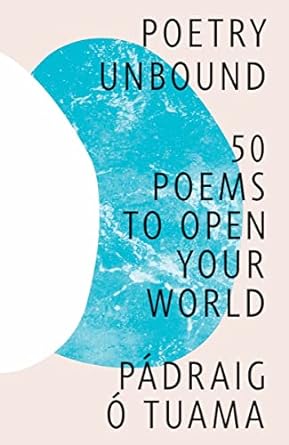
There are poems I repeat to myself, almost like a hum, or a prayer, or a spell. I’ve said them so often they trip off my tongue. It feels like they’ve gone into my body. I know some people who learn many poems off by heart, and I keep trying to start up that habit again. I haven’t yet been successful. So I return to the ones I’ve been repeating for years, again, and again, and again. They’re comforts, a little bit of home carried in sound.
from Poetry Unbound
Pádraig Ó Tuama
Publisher: W.W. Norton and Company
Poetry for the hopelessly unpoetic
April is National Poetry Month, and a good friend, knowing that I possess the poetic sensibility of a potato, gave me this book. It was a wonderful and wise choice. Unlike many poetry collections where you read one incomprehensible poem after another (What in the heck was that about?), this book acts as an interpretive guide to poems, exploring and unpacking them, revealing the power and the truth layered between their lines and in their vast open spaces.
The Irish poet Pádraig Ó Tuama, presenter of the podcast "Poetry Unbound", presents a selection of 50 poems that have been special to him, reflecting on each poem and helping we the hopelessly unpoetic understand how to approach and engage a poem. This not the dry “explication” of poems many of us endured in high school English “that seemed to flatten the life of any poem,” the literary equivalent of dissecting worms in biology class. Instead, Ó Tuama uses each poem to wonder, to muse, to remember and dream out loud. Each poem becomes an invitation, a prompt, a means of sounding the depths of one’s own soul. The point is less to figure out what the poet “meant,” than to see what the words spark within oneself, less solving a riddle than entering into a dialogue.
Many of these poems are written by “marginalized people,” people whose views and voices are not often heard. Some of the poems challenge us to “get uncomfortable about (our) comfort.” For example, Ilya Kaminsky’s collection, Deaf Republic, could be speaking of Gaza, Sudan or Ukraine, or any time: “In the sixth month/ of a disastrous reign in the house of money/ in the street of money in the city of money in the country of money,/ our great country of money, we (forgive us)/ lived happily during the war.” It concludes, “we/ protested/ but not enough.”
Some poems are very brief, packing an emotional punch in their brevity, such as Rafiq Kathwari’s touching “On Receiving Father at JFK after his Long Flight from Kashmir”:
“As I fling my arms wide, he extends his hand.” Ten words that capture a generational divide, a cultural divide, an emotional gulf between father and émigré son.
I found it helpful to read a poem, then read Ó Tuama’s ruminations on it, then re-read the poem again, which often set off my own ruminations. This interactive approach to poetry has opened me, deepened me, revealed me to the world in new ways. As Ó Tuama observes, poems remind us “what it means to be in this world.”
(Note: Inspired to give poetry a second chance? The Academy of American Poets will send a Poem-A-Day to your email inbox. Subscribe free at their website: poets.org.)
This review first appeared in The Columbia River Reader (April 15, 2024.) Reprinted with permission.



